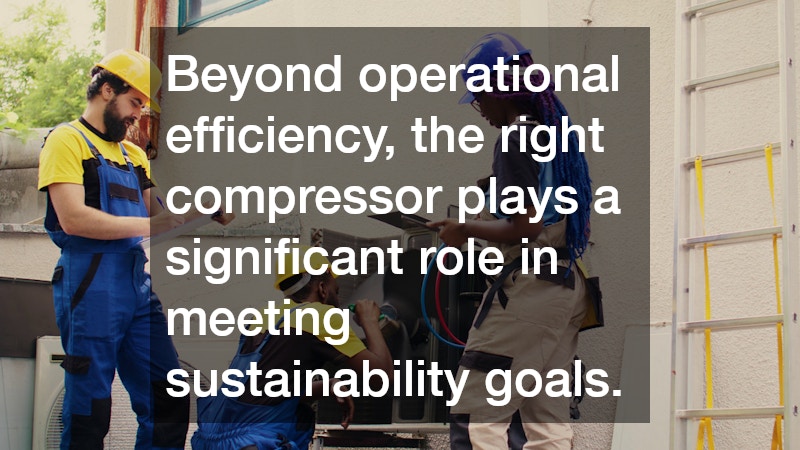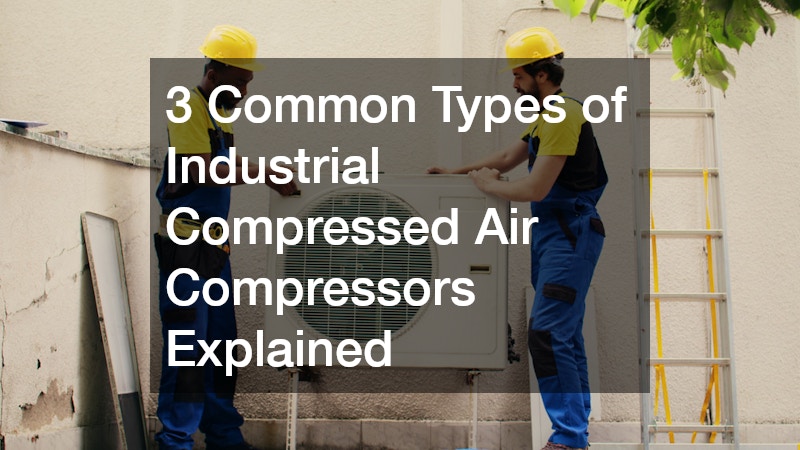Industrial compressed air compressors are vital components in various sectors, playing a crucial role in the functionality and efficiency of machines and tools. Understanding the types, benefits, and applications of these compressors can help industries make informed decisions. In this article, we will explore three common types of industrial compressed air compressors, examining their unique features and uses.
These devices are integral to the daily operations of many sectors, including manufacturing, automotive, and even food processing industries. Identifying the right type of compressor to match specific requirements is crucial to optimize performance and energy consumption.
What Are the Main Types of Industrial Compressed Air Compressors?
Reciprocating Air Compressors
Reciprocating air compressors are positive displacement machines known for their robustness and versatility. They function by increasing air pressure through the reciprocating motion of pistons, making them suitable for applications with varying demand. Such compressors are often the preferred choice for industries requiring flexibility and those with intermittent air demands. They can also handle high pressures, which many other compressors struggle to achieve efficiently. Although they require more maintenance due to moving parts, their cost-effectiveness in the right applications cannot be overstated.
Screw Air Compressors
Screw air compressors utilize rotors for continuous airflow, making them ideal for operations requiring constant air supply. Their efficiency and long lifespan make them indispensable in environments where reliability is paramount. Often employed in extensive applications, these compressors support high-performance tasks that can’t afford frequent interruptions. Industries such as automotive and food processing leverage the consistent output of screw air compressors to maintain seamless operations. With fewer moving parts than reciprocating compressors, screw compressors tend to have lower maintenance needs and longer operational lives.
How Do Compressed Air Compressors Work?
Principles of Air Compression
The compression process involves reducing the volume of air to increase its pressure. This principle is fundamental to power machines and tools across multiple industries. Reciprocating compressors achieve compression through a back-and-forth piston action, while screw compressors use counter-rotating rotors. Even though the mechanisms vary, the goal of converting input energy into compressed air remains consistent. To optimize efficiency, understanding each type’s operational dynamics is crucial. It ensures that the right compressor is chosen based on specific operational needs and energy consumption patterns.
Energy Consumption and Efficiency
Understanding the energy usage of air compressors is crucial for operational efficiency. Each compressor type has different energy efficiency ratings, which impacts operational costs and environmental footprint. Screw compressors, for instance, generally offer better energy efficiency in continuous operation settings. Conversely, reciprocating compressors might be more suitable for lower intensity applications. As compressors consume significant energy, choosing the wrong type can lead to unnecessarily high costs and environmental impact. Thus, energy efficiency should be a primary consideration during selection.
What Are the Best Applications for Each Compressor Type?
Applications of Reciprocating Compressors
Reciprocating compressors are often found in workshops and small manufacturing units where intermittent air demand is standard. Their straightforward design allows for easy maintenance and repair. Also, their ability to handle higher pressures makes them suitable for heavy-duty applications where precision tools are used. Small businesses appreciate their versatility and cost-effectiveness, especially when a large, continuous air supply is not essential. Despite the higher maintenance due to their moving parts, the reliability in varied operations justifies their widespread use.
Applications of Screw Compressors
Screw compressors are extensively used in large-scale industries such as automotive and food processing, where a constant stream of compressed air is necessary. Their continuous operational ability makes them indispensable in such environments. Large-scale operations that rely on automation particularly benefit from screw compressors due to their reliability and efficiency. Moreover, industries using these compressors experience fewer interruptions, boosting productivity. Their robust design ensures they can run for extended periods with minimal maintenance interventions.
Importance of Understanding Compressor Types
Understanding the different types of industrial compressed air compressors and their applications is crucial for selecting the most appropriate equipment for specific industrial needs. Each compressor type is designed with unique features that suit particular operational requirements, ensuring that the right match leads to optimal system performance.
Advantages and Ideal Use Cases
Each type of compressor offers distinct advantages. For example, reciprocating compressors are known for their durability and suitability for intermittent, high-pressure applications, while screw compressors are valued for their economic efficiency and continuous operation capability. Recognizing these strengths helps industries choose compressors that align with their production demands and operational schedules.
Benefits of Informed Decision-Making
Making an informed choice in compressor selection results in tangible benefits such as improved performance, reduced energy consumption, and enhanced productivity. Selecting the right compressor minimizes downtime and maintenance needs, ultimately leading to cost savings and smoother industrial processes.
Staying Updated with Technological Advancements
As industrial technologies evolve, keeping up-to-date with advancements in compressor designs and energy-efficient solutions is essential. Continuous learning about new compressor technologies enables industries to upgrade their systems and remain competitive in a rapidly changing market environment.
Contribution to Operational Efficiency and Sustainability
Beyond operational efficiency, the right compressor plays a significant role in meeting sustainability goals. Optimizing energy use through the selection of efficient compressors reduces environmental impact and supports corporate responsibility initiatives, making sustainability a key consideration in compressor choice.




